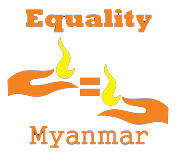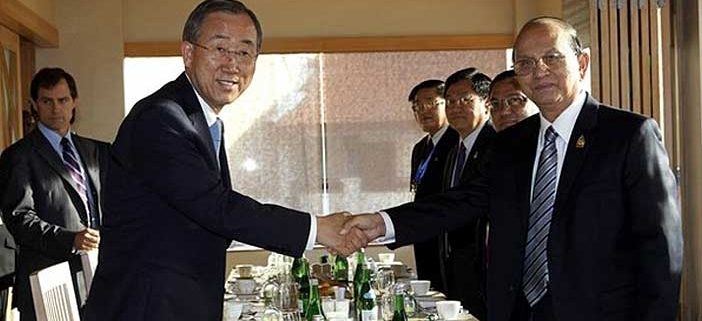TUESDAY, 22 NOVEMBER 2011
The Irrawaddy – A key UN committee expressed grave concern over human rights violations in Burma in a resolution on Monday that was welcomed by the US and Britain, but which the representative of the Burmese government lamented did not reflect the real situation of the country.
The Third Committee of the UN General Assembly approved the resolution, which expressed grave concern about ongoing systematic violations of the human rights and fundamental freedoms of the people of Burma, by a vote of 98 in favor to 25 against, with 63 abstentions. As expected, China and India voted against the resolution.
The resolution, introduced by Poland on behalf of the European Union, welcomed the positive steps taken by the Burmese government, including the recent release of political prisoners and talks with members of the political opposition, such as Aung San Suu Kyi. Nonetheless, a wide range of human rights violations continued to be perpetrated with impunity in Burma, it said.
“Today’s resolution calls on the government to lift all restrictions on the freedoms of assembly, association and movement and the freedom of expression, and expresses continuing concern over violations of human rights,” the US ambassador to the UN, Susan Rice, told reporters at the UN headquarters in New York.
The General Assembly has welcomed recent talks between the government and Suu Kyi’s National League for Democracy (NLD) and other opposition parties, reflecting the international community’s hope for progress in the country, Rice said.
Welcoming the resolution, the British Foreign Secretary William Hague acknowledged encouraging signs of progress in Burma over the past year. “But human rights abuses continue, especially in ethnic areas, and the level of support for this resolution shows once again that the international community has not forgotten the people of Burma,” he said.
“I am pleased to see a resolution which reflects the positive steps taken by the Burmese government, the commitments made by the president, as well as the serious concerns which remain and the need for accountability for human rights abuses past and present,” Hague said.
Welcoming recent talks between the Burmese government and Suu Kyi and opposition parties, the resolution encouraged the government to develop the current talks into a substantive and regular dialogue while comprehensively engaging with the democratic opposition and political, ethnic and civil society groups and actors in order to begin an all‑inclusive and democratic reform process leading to national reconciliation and lasting peace in Burma.
Urging the Burmese government to release all political prisoners without further delay, the resolution called on Burma to undertake a full, transparent, effective, impartial and independent investigation into all reports of human rights violations and to bring to justice those responsible in order to end impunity for violations of human rights.
Expressing deep concern about the resumption of armed conflict and the breakdown of long‑standing ceasefires in Kachin and Shan states, the resolution strongly called upon the Burmese government to take urgent measures to put an end to continuing grave violations of international human rights and humanitarian law, including the targeting of persons based on their belonging to particular ethnic groups, the targeting of civilians as such in military operations, and rape and other forms of sexual violence, and to end impunity for such acts.
The Burmese representative said the resolution failed to show the entire situation and accused its main sponsor, the European Union, of exploiting human rights for political purposes.
“It is an undeniable fact that Myanmar [Burma] has been moving toward further positive changes and the international community has already witnessed our goodwill,” he said. “At this juncture, we do deserve warm welcome, kind understanding and sincere encouragements of the international community, rather than an unconstructive approach by adopting such a resolution,” he argued.
India, which voted against the resolution, said it traditionally has not been in favor of country‑specific resolutions, which had historically been found counterproductive. It asked the co‑sponsors of the resolution not to pursue it, particularly in light of recent reforms in the country.
The Chinese representative said all human rights questions should be addressed through dialogue and cooperation and said that China is against all country‑specific texts.
Photo : Reuters


 Equality Myanmar (EQMM) is a leading nongovernmental organization that organises a wide range of human rights education and advocacy programs, the documentation human rights violations, and provides emergency support for activists, human rights defenders, and their families. We work with a range of local civil society organizations, educators, activists, various local actors, and our programs and activities reach all states and regions in Myanmar.
Equality Myanmar (EQMM) is a leading nongovernmental organization that organises a wide range of human rights education and advocacy programs, the documentation human rights violations, and provides emergency support for activists, human rights defenders, and their families. We work with a range of local civil society organizations, educators, activists, various local actors, and our programs and activities reach all states and regions in Myanmar.
